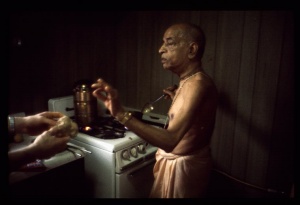SB 5.1.27

A.C. Bhaktivedanta Swami Prabhupada
TEXT 27
- tasminn u ha vā upaśama-śīlāḥ paramarṣayaḥ sakala-jīva-nikāyāvāsasya bhagavato
- vāsudevasya bhītānāṁ śaraṇa-bhūtasya śrīmac-caraṇāravindāvirata-smaraṇāvigalita-parama-bhakti-yogānu-bhāvena
- paribhāvitāntar-hṛdayādhigate bhagavati sarveṣāṁ bhūtānām ātma-bhūte pratyag-ātmany evātmanas
- tādātmyam aviśeṣeṇa samīyuḥ
SYNONYMS
tasmin — in that paramahaṁsa-āśrama; u — certainly; ha — so celebrated; vā — indeed; upaśama-śīlāḥ — in the renounced order of life; parama-ṛṣayaḥ — the great sages; sakala — all; jīva — of living entities; nikāya — in total; āvāsasya — the residence; bhagavataḥ — of the Supreme Personality of Godhead; vāsudevasya — Lord Vāsudeva; bhītānām — of those afraid of material existence; śaraṇa-bhūtasya — the one who is the only shelter; śrīmat — of the Supreme Personality of Godhead; caraṇa-aravinda — the lotus feet; avirata — constantly; smaraṇa — remembering; avigalita — completely uncontaminated; parama — supreme; bhakti-yoga — of mystic devotional service; anubhāvena — by the prowess; paribhāvita — purified; antaḥ — within; hṛdaya — the heart; adhigate — perceived; bhagavati — the Supreme Personality of Godhead; sarveṣām — of all; bhūtānām — living entities; ātma-bhūte — situated within the body; pratyak — directly; ātmani — with the Supreme Supersoul; eva — certainly; ātmanaḥ — of the self; tādātmyam — qualitative equality; aviśeṣeṇa — without differences; samīyuḥ — realized.
TRANSLATION
Thus situated in the renounced order from the beginning of their lives, all three of them completely controlled the activities of their senses and thus became great saints. They concentrated their minds always upon the lotus feet of the Supreme Personality of Godhead, who is the resting place of the totality of living entities and who is therefore celebrated as Vāsudeva. Lord Vāsudeva is the only shelter of those who are actually afraid of material existence. By constantly thinking of His lotus feet, these three sons of Mahārāja Priyavrata became advanced in pure devotional service. By the prowess of their devotional service, they could directly perceive the Supreme Personality of Godhead, who is situated in everyone's heart as the Supersoul, and realize that there was qualitatively no difference between themselves and Him.
PURPORT
The paramahaṁsa stage is the topmost position in renounced life. In sannyāsa, the renounced order, there are four stages—kuṭīcaka, bahūdaka, parivrājakācārya and paramahaṁsa. According to the Vedic system, when one accepts the renounced order, he stays outside his village in a cottage, and his necessities, especially his food, are supplied from home. This is called the kuṭīcaka stage. When a sannyāsī advances further, he no longer accepts anything from home: instead, he collects his necessities, especially his food, from many places. This system is called mādhukarī, which literally means "the profession of the bumblebees." As bumblebees collect honey from many flowers, a little from each, so a sannyāsī should beg from door to door but not accept very much food from any particular house; he should collect a little bit from every house. This is called the bahūdaka stage. When a sannyāsī is still more experienced, he travels all over the world to preach the glories of Lord Vāsudeva. He is then known as parivrājakācārya. The sannyāsī reaches the paramahaṁsa stage when he finishes his preaching work and sits down in one place, strictly for the sake of advancing in spiritual life. An actual paramahaṁsa is one who completely controls his senses and engages in the unalloyed service of the Lord. Therefore all three of these sons of Priyavrata, namely Kavi, Mahāvīra and Savana, were situated in the paramahaṁsa stage from the very beginning. Their senses could not disturb them, for their senses were completely engaged in serving the Lord. Therefore the three brothers are described in this verse as upaśama-śīlāḥ. Upaśama means "completely subdued." Because they completely subdued their senses, they are understood to have been great sages and saints.
After subduing their senses, the three brothers concentrated their minds upon the lotus feet of Vāsudeva, Lord Kṛṣṇa. As stated in Bhagavad-gītā (BG 7.19), vāsudevaḥ sarvam iti. The lotus feet of Vāsudeva are everything. Lord Vāsudeva is the reservoir of all living entities. When this cosmic manifestation is dissolved, all living entities enter the supreme body of the Lord, Garbhodakaśāyī Viṣṇu, who merges within the body of Mahā-Viṣṇu. Both of these viṣṇu-tattvas are vāsudeva-tattvas, and therefore the great sages Kavi, Mahāvīra and Savana concentrated always upon the lotus feet of Lord Vāsudeva, Kṛṣṇa. In this way they could understand that the Supersoul within the heart is the Supreme Personality of Godhead, and they could recognize their identity with Him. The complete description of this realization is that simply by discharging the unalloyed form of devotional service, one can realize his self completely. The parama-bhakti-yoga mentioned in this verse means that a living entity, by dint of unalloyed devotional service, has no other interest than the service of the Lord, as described in Bhagavad-gītā vāsudevaḥ sarvam iti (BG 7.19). By parama-bhakti-yoga, by elevating oneself to the highest platform of loving service, one can automatically be relieved from the bodily concept of life and see the Supreme Personality of Godhead face to face. As confirmed in Brahma-saṁhitā:
- premāñjana-cchurita-bhakti-vilocanena
- santaḥ sadaiva hṛdayeṣu vilokayanti
- yaṁ śyāmasundaram acintya-guṇa-svarūpaṁ
- govindam ādi-puruṣaṁ tam ahaṁ bhajāmi''
- (BS 5.38)
An advanced devotee, who is known as a sat, or saint, can always see within his heart the Supreme Personality of Godhead, face to face. Kṛṣṇa, Śyāmasundara, expands Himself by His plenary portion, and thus a devotee can always see Him within his heart.